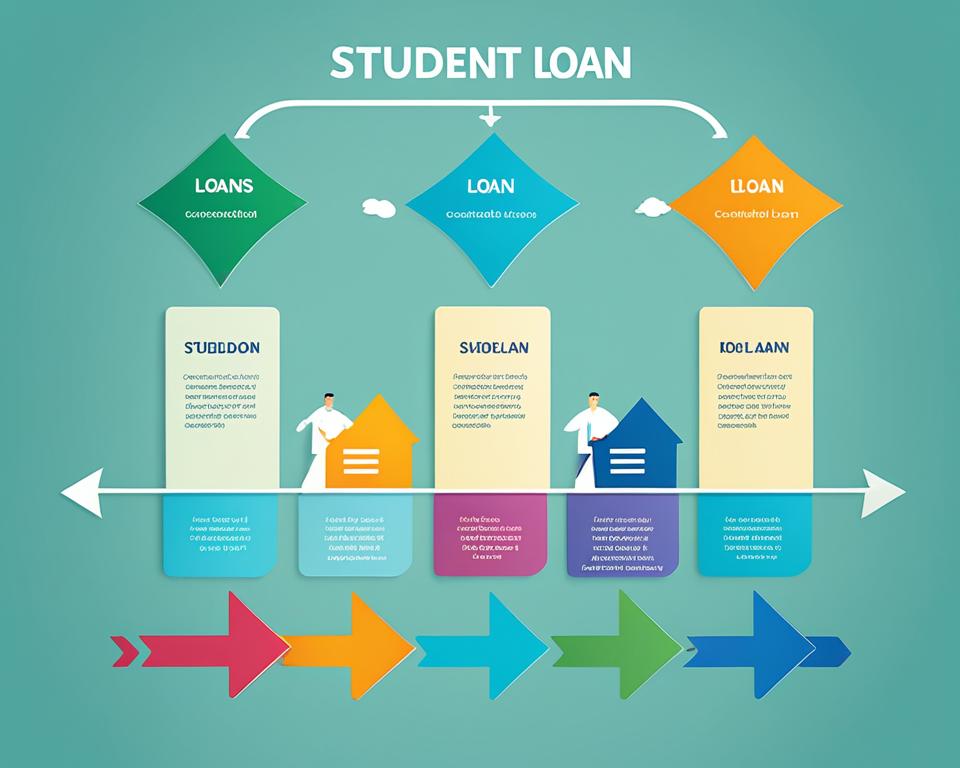Navigating the complexities of financial obligations can be daunting, but with the right debt consolidation advice and strategies, managing debt becomes a more approachable task. For those looking to streamline multiple debts into a single payment plan, understanding and applying debt consolidation best practices is essential. By adhering to proven debt management strategies, individuals can transform seemingly insurmountable financial burdens into manageable monthly payments, paving the way towards financial stability.
To achieve success in debt consolidation, it is crucial to adopt a smart approach to managing income and expenses. A balanced budget that prioritizes debt repayment, aligned with one’s personal needs and financial goals, is the cornerstone of any effective debt management plan. Embracing the discipline required for this financial journey not only assists in resolving current debt but also fortifies one’s resilience against future financial challenges.
Key Takeaways
- Adherence to debt consolidation advice is paramount for managing debt efficiently.
- Debt management strategies provide a road-map to navigate through debt consolidation.
- Implementing a budget using the 50/30/20 rule is a financially sound practice.
- Success in debt consolidation requires consistency, discipline, and persistence.
- Extra payments and automating finances play a significant role in debt reduction.
Understanding the Basics of Debt Consolidation
When it comes to debt consolidation best practices, grasping the fundamental concepts is essential. This approach involves more than just merging outstanding balances; it is strategically meant for consolidating debt successfully. Before delving into what this financial move means, it’s important to address not only its definition but also the immediate and long-term effects it has on personal finance.
Defining Debt Consolidation and How It Works
At its core, debt consolidation is the process of taking out a new loan to pay off a variety of existing debts. Often, this new loan comes with a lower interest rate, resulting in smaller monthly payments. This tactic can be particularly helpful for individuals juggling multiple bills each month, as it simplifies their financial obligations into a single, more manageable payment. Debt consolidation tips frequently hinge on the importance of a strong credit history, which can be instrumental in securing the most favorable loan terms.
The Impact of Consolidating Debt on Your Financial Landscape
Effective debt consolidation has the potential to substantially alleviate financial stress. By amalgamating several debts into one, there’s a clear path forward and an opportunity for savings through lower interest rates. Moreover, this process can streamline budgeting and ensure funds are directly applied to reducing debt. Over time, consolidating debt successfully can result in significant financial freedom, aligning current spending with future financial ambitions.
Assessing Your Debt: Starting Your Journey
Embarking on the path toward successful debt consolidation begins with a methodical evaluation of your financial obligations. It’s imperative to establish a detailed inventory of your debts to understand the full scope of what you’re managing. This foundational step not only assists in devising effective debt management strategies but also sets a clear course towards financial stability.
Creating a Thorough Debt Inventory
Compiling a comprehensive list of all outstanding debts provides a concrete starting point for managing debt. This inventory should include crucial details such as balances owed, interest rates, monthly payment requirements, and due dates. These data points are essential for visualizing the entirety of the debt landscape and are a precursor to establishing a groundwork for consolidation efforts.
| Creditor | Balance Owed | Interest Rate | Monthly Payment | Due Date |
|---|---|---|---|---|
| Credit Card Company A | $5,000 | 19% | $150 | 15th of the month |
| Student Loan Servicer | $20,000 | 6% | $220 | 1st of the month |
| Auto Finance Lender | $10,000 | 5% | $350 | 22nd of the month |
Identifying Good Debt vs. Bad Debt
Not all debts are created equal, and recognizing the distinction between good debt and bad debt is a fundamental element of proficient debt management. Good debts are often associated with investments that can increase in value or generate long-term income—think student loans for education or mortgages for property. In contrast, bad debts typically stem from assets that depreciate or carry hefty interest rates, such as high-interest credit cards for non-essential purchases. Prioritizing the repayment of bad debts can significantly improve your financial health and hasten the success of your debt consolidation efforts.
- Good Debt: Mortgages, Student Loans, Business Loans
- Bad Debt: Credit Card Debt, High-Interest Personal Loans, Payday Loans
Strategizing Your Debt Payoff
When it comes to managing debt, having a solid payoff strategy is essential. It’s not just about making minimum payments; it’s about creating and executing a plan that will help you become debt-free in the most efficient way possible. There are several paths to achieving this goal, but two popular methods stand out—should you start a snowball or cause an avalanche?
Snowball vs. Avalanche: Which Strategy Suits You Best?
The snowball method is all about momentum. By focusing on the smallest debts first and working your way up, you gain a sense of accomplishment with each debt you eliminate. This psychological boost can be invaluable in keeping you motivated. On the other hand, the avalanche method is for the more analytical mind; it prioritizes debts with the highest interest rates to save money over the long term. This approach requires discipline, but it can lead to significant savings on interest charges, making it a strong piece of debt consolidation advice for those who can stick with it.
Calculating the Potential Savings From Extra Payments
Regardless of which method you choose, incorporating extra payments into your strategy amplifies your efforts. Every additional dollar you put toward your debt reduces the principal balance, which in turn decreases the amount of interest you’ll have to pay. This strategy is a cornerstone among tips for managing debt: paying more now means paying less later. It’s a simple yet powerful component of debt consolidation tips that can lead to greater financial freedom more quickly. Exploring potential savings from extra payments is a numerical affirmation of your progress and spurs continued fiscal responsibility and dedication to your debt payoff plan.
Remember, managing debt successfully is within reach. It requires a plan, determination, and the willingness to follow through with your strategy. Whether you choose the snowball or avalanche method, or a customized blend of the two, the key is to start. By taking action today, you set yourself on the path toward a debt-free tomorrow.
Do you have any tips for successfully managing debt consolidation?
Managing debt consolidation effectively hinges on a well-crafted strategy that encompasses a variety of crucial steps. Developing a feasible budget, where expenses are allocated using the acclaimed 50/30/20 rule, is essential. In this budgeting approach, you allocate 50% of your income to necessities, 30% to wants, and the crucial 20% towards savings and repaying debts.
Central to successful debt consolidation is the effort to prioritize high-interest debts. It is beneficial to target these expensive debts first, as it can lead to significant savings on interest charges over time. Moreover, generating additional income through side hustles can substantially aid in accelerating the debt payoff process.

Another pivotal aspect of managing debt is motivation. A clear, personal reason for wanting to be debt-free acts as a powerful incentive through any financial challenge. This could range from desiring a more secure future for one’s family to achieving personal life goals. Add to this the importance of staying psychologically prepared for the journey, and you’ve got the foundation of a debt consolidation plan that endures.
- Establish a budget using the 50/30/20 principle for controlled spending
- Focus on paying off high-interest debts as a priority
- Increase your income with side jobs to allocate more towards debt repayment
- Stay determined and keep your debt-free goals in sight for continued motivation
- Prepare mentally for the challenges that come with managing and consolidating debts
By implementing these debt consolidation tips and maintaining a disciplined approach, individuals can navigate the bumps along the road to financial freedom.
Smart Budgeting for Debt Repayment
Embarking on a path to financial stability frequently leads one to explore the benefits of debt consolidation. This approach not only simplifies the repayment process but can also coincide with smart budgeting for debt repayment, ensuring one manages debt efficiently. The following insights offer essential debt consolidation tips to harness your finances and effectively navigate the maze of debts.
Utilizing the 50/30/20 Rule for Financial Balance
One of the foundational principles of personal finance is adopting the 50/30/20 budgeting rule. By dedicating 50% of your after-tax income to essential needs, 30% to wants, and the remaining 20% to savings and debt repayment, you’re strategically carving a roadmap for fiscal health. This simple yet effective allocation provides a structured approach for those managing debt, especially when coupled with the goal of debt consolidation.
Adjusting Your Budget to Accelerate Debt Payoff
When prioritizing debt repayment, one might find it beneficial to tweak the 30% allocation reserved for wants. Temporarily reallocating a portion of these funds to repay debt faster can shorten the lifespan of your debt and reduce the interest paid over time. Moreover, keeping a close eye on your budget through tracking expenses can uncover additional opportunities to streamline your financial output, maximizing the efficacy of debt consolidation.
Automating your debt payments is another savvy technique to ensure timeliness and consistency, which can lead to an improved credit score and reduced financial strain. By adjusting your budget and embracing these debt consolidation tips, you’ll position yourself to navigate through debts more rapidly, bringing you closer to the ultimate goal of financial freedom.
Maximizing Your Income
Tackling debt consolidation requires more than just smart management; it involves actively seeking ways to maximise income. There’s substantial potential in exploring side hustles for debt reduction. These can range from freelance endeavors to leveraging hobbies into additional revenue streams. Similarly, managing debt consolidation can be significantly enhanced by strategically using windfalls like tax refunds or unexpected bonuses to pay down debt.
Turning Hobbies into Side Hustles
Many people find financial success by transforming their hobbies into profitable ventures. Whether it’s crafting handmade goods, providing freelance writing, or offering web design services, these side hustles can provide the extra income needed to reach debt reduction goals more swiftly.
Using Windfalls and Bonuses to Reduce Debt
Rather than viewing bonuses, tax refunds, or other windfalls as ‘free money’, allocating these funds directly to debt can make a significant impact. This strategy reduces overall interest and brings you closer to financial freedom, hence effectively managing debt consolidation.
| SIDE HUSTLE IDEAS | POTENTIAL EARNINGS | DEBT REDUCTION IMPACT |
|---|---|---|
| Photography Services | $500 – $3000 per event | Pay an extra credit card payment |
| Online Tutoring | $20 – $50 per hour | Cover a month’s car loan |
| Etsy Craft Seller | Varies on product and sales | Contribute to an emergency fund |
| Unexpected Bonus | $1000 – $5000 | Make a significant payment to debt principal |
Making Every Dollar Count
When it comes to managing debt, ensuring that you’re making the most of every dollar is essential. Cutting costs doesn’t just mean spending less—it means spending smart. By closely monitoring where your money is going, and aligning those expenditures with your core values, you have the potential to both save more and find greater satisfaction with your financial decisions.
Tracking Your Spending and Cutting Costs
Meticulously noting each expense allows you to take a magnifying glass to your financial habits. Are there subscriptions you no longer use? Or maybe a daily coffee purchase that could be replaced with a home-brewed cup? Even small shifts in spending can accumulate to create substantial savings over time, easing the burden of debt and providing you with more liberty to focus on debt consolidation advice.
Aligning Expenses with Your Values
Spending money on what truly matters to you can transform your financial landscape. It encourages a culture of thoughtful consumption, reducing impulsive buys and promoting investments in experiences and products that add real value to your life. This principle assists in not only making every dollar count but also in constructing a life enriched by meaningful choices that support your journey toward financial freedom.
| Expense Category | Average Monthly Cost | Potential Monthly Saving | Value Alignment |
|---|---|---|---|
| Dining Out | $250 | $150 | Low |
| Entertainment | $100 | $50 | Medium |
| Subscriptions | $75 | $25 | Varies |
| Gym Membership | $60 | $10 | High |
| Coffee Shops | $45 | $30 | Low |
By revising your budget with these considerations, you set yourself on a more sustainable path towards managing your debt. The act of balancing finances becomes not just about the numbers, but also about fortifying the personal values that define your lifestyle and future goals. With every dollar accounted for and invested wisely, the path to debt consolidation becomes clearer and more attainable.
Consolidating Debt Successfully
Finding the right path for debt consolidation can be a straightforward process when armed with the right information. Navigating through various debt relief options is crucial for consolidating debt successfully. In this regard, understanding the potential balance transfer benefits and comparing them with the features of a consolidation loan, remains a cornerstone of smart financial strategy.

Evaluating Balance Transfer vs. Consolidation Loan
When it comes to managing outstanding balances, a balance transfer card with an introductory 0% APR offer can be an attractive option. This approach allows individuals to transfer existing balances from high-interest credit cards to a new card with no interest over a set period. Done wisely, consolidating multiple accounts into a single, manageable account can lead to substantial interest savings.
On the other hand, a debt consolidation loan offers the convenience of paying off multiple debts with a single loan, typically at a lower interest rate. By consolidating your debts into one loan, you replace multiple payments and interest rates with a single monthly payment and a fixed interest rate, simplifying your finances and possibly reducing the interest paid over time.
It’s important to compare these options side by side to determine which one aligns with your current financial situation and future goals. Consider the following criteria:
| Feature | Balance Transfer | Consolidation Loan |
|---|---|---|
| Interest Rate | 0% introductory APR | Fixed, potentially lower than credit card rates |
| Term | Short-term benefits during introductory period | Long-term repayment plan |
| Fees | Balance transfer fee | Origination or closing fees |
| Credit Impact | Can be positive if managed properly | Can help streamline debts and potentially improve credit |
Understanding the Terms and Qualifications for Consolidation
Regardless of whether you opt for a balance transfer card or a debt consolidation loan, familiarizing yourself with the terms and qualifications is essential. Most consolidation vehicles entail the following requisites:
- Minimum credit score requirements
- Income stability
- Debt-to-income ratio
Also, factor in the costs such as transfer fees or loan origination fees, and ensure you are fully aware of any penalties for late payments or going over the credit limit. Even with a 0% APR transfer card, the interest may skyrocket after the promotional period, turning an initially favorable strategy into a costly one if the balance isn’t managed effectively within that timeframe. Loans typically offer a more predictable route with fixed repayment schedules but may also require a higher qualifying credit score.
Ultimately, a successful debt consolidation plan depends on a thorough evaluation of your financial situation, a clear comparison of options, and an honest assessment of your ability to meet payment terms. With the right approach, consolidating debt can streamline your finances and help you tread the path toward financial stability.
Negotiating with Creditors
When faced with the daunting task of managing debt consolidation, one effective avenue often overlooked is the strategy of negotiating with creditors. Far from being an admission of defeat, entering into dialogue with lending institutions can pave the way to a more manageable financial scenario, turning a tense situation into a beneficial one for all parties involved.
Approaching Creditors for Favorable Terms
Negotiating with creditors is much more than simply asking for leniency; it’s about presenting a clear and realistic plan that demonstrates your commitment to resolving your financial obligations. This could involve seeking adjustments to your repayment plan, securing reductions in interest rates, or pushing for a more extended period before payments are due. Effective debt settlement strategies not only require an understanding of creditors’ expectations but also a well-prepared case underlining your determination to clear the debts.
Open, honest communication is paramount. A well-thought-out proposal and willingness to compromise can lead to favorable terms that benefit both the borrower and the creditor.
Settling Debts for Less Than What is Owed
Additionally, in some circumstances, creditors are willing to settle for an amount that is less than the total owed–a negotiation tactic that requires careful consideration and a strategic approach. While this outcome can provide immediate financial relief and assist in managing debt consolidation more effectively, it is crucial to be mindful of potential repercussions, such as impacts on credit scores.
Keep in mind that every negotiation is unique, and creditors’ openness to settle debts varies based on numerous factors, including your payment history, the age of the debt, and the creditor’s policies.
As each financial situation is unique, it is advised to approach such negotiations with thorough preparation and, if possible, the guidance of a financial advisor.
Managing Emotional Aspects of Debt
Dealing with debt extends beyond numbers and financial strategies; it often invokes significant emotional challenges. Recognizing these emotional aspects is a crucial step in any successful debt management strategy. By tending to both the psychological and practical elements of debt, individuals can find a more holistic pathway to financial stability.
Staying Motivated During the Debt Payoff Process
Staying steadfast on the journey towards debt freedom requires a robust motivational foundation. Key to this is the power of visualization—a compelling tool in maintaining the focus needed for lengthy financial endeavors. Individuals are encouraged to routinely remind themselves of the benefits that a debt-free life will bring, be it peace of mind, future savings, or the ability to pursue personal goals. This visualization helps in staying motivated even when faced with setbacks or slow progress.
Coping with the Stress of Debt Management
Coping with debt stress is another dimension that can not be overlooked. The tension resulting from financial strain can have far-reaching implications on one’s overall wellbeing. It is vital to acknowledge these feelings without judgement and embrace various healthy coping mechanisms. Engaging in supportive communities, practicing mindfulness, and maintaining a balanced lifestyle can bolster resilience throughout the debt management process.
Ultimately, the integration of solid debt management strategies with attentive self-care routines forms the cornerstone of overcoming the emotional hurdles of debt. It not only fosters enhanced mental health but also propels forward momentum towards achieving a debt-free life.
Maintaining a Good Credit Score
Achieving a good credit score is essential for financial health, and negotiating the intricacies of debt consolidation can have a dual impact on your credit report. The actions you take during and after the consolidation process are pivotal in determining whether your credit score moves in a favorable direction. With pragmatic management, consolidating your debt can lead to an improved credit score, enhancing your borrowing capabilities for future endeavors.
How Debt Consolidation Can Affect Your Credit
Debt consolidation is frequently seen as a beacon of hope for those juggling multiple debts. By centralizing your obligations under a single account, you might achieve a better credit utilization ratio—a key factor in calculating credit scores. However, the initial application for a consolidation loan could slightly ding your score due to the credit inquiry. Moreover, it’s crucial to refrain from amassing new debt, as this could offset any potential benefits to your credit score derived from consolidation.
Strategies to Protect and Improve Your Credit Score
When it comes to protecting and improving your credit score in the wake of debt consolidation, several strategies stand out:
- Maintain timely payments to demonstrate reliability to creditors.
- Keep credit card balances low, solidifying a lower utilization rate.
- Avoid the impulse to close old credit accounts, as they add to your credit history’s depth.
These practices encourage a trajectory towards a good credit score and financial freedom.
| Action | Immediate Credit Impact | Long-term Credit Benefit |
|---|---|---|
| Applying for a Consolidation Loan | Minor decrease due to inquiry | Potential for better rates on future loans |
| Consolidating Credit Balances | May vary based on overall use | Improves credit utilization ratio |
| Automating Payments | Neutral | Ensures on-time payments, boosting score |
| Keeping Old Accounts Open | Neutral | Lengthens credit history, a positive metric |
By employing these tactics and understanding the debt consolidation impact, you’re setting a course for a sturdy financial reputation and the myriad of opportunities that come with a strong credit score.
Utilizing Professional Debt Management Services
Confronting a mountain of debt can be a daunting experience; however, there’s a beacon of hope in seeking professional help. Professional debt management services play a pivotal role in navigating the treacherous waters of financial obligations. These services are tailored to aid individuals who find themselves struggling to manage their repayment schedules, providing a structured path to financial stability.

When to Seek Credit Counseling
If keeping up with debt payments becomes overwhelming, it’s time to consider credit counseling. Recognized as the first official step towards gaining control over one’s financial situation, credit counseling serves as a cornerstone of professional debt management. Experts in this field assess an individual’s financial status and offer actionable advice on budgeting, debt prioritization, and fiscal responsibility.
The Role of Debt Management Plans
Integral to the spectrum of professional debt management services are debt management plans (DMPs). These plans are strategic arrangements constructed by credit counselors to consolidate multiple debts into a single, manageable payment. DMPs often result in reduced interest rates and waived fees, as credit counselors negotiate with creditors to arrive at favorable terms. With a well-structured DMP, debtors can progressively eliminate their debts, leading to a more secure financial future.
Legal Considerations of Debt Consolidation
Embarking on debt consolidation requires not just financial acumen but also a sound understanding of the legal landscape. Aided by expertise in debt settlement and bankruptcy laws, individuals can navigate these complex processes while minimizing potential legal repercussions. It’s critical to recognize the legal underpinnings that anchor the strategies chosen for managing overwhelming debt.
Understanding the Legalities of Debt Settlement
Debt settlement, a pivotal aspect of debt resolution, involves negotiating with creditors to pay off a debt for less than the owed amount. This method may seem like a lifeline, yet it is laden with legal stipulations. It is paramount for debtors to be cognizant of the implications, including the possibility of forgiven debt being taxable as income. Therefore, consulting with a financial advisor or an attorney before engaging in debt settlement talks is a prudent course of action.
Navigating Bankruptcy as a Last Resort
When debt consolidation and settlement are no longer viable, bankruptcy might surface as the only recourse. This legal mechanism offers a clean slate for those drowning in debt, yet it is coupled with enduring side effects on one’s creditworthiness. Determining eligibility, understanding the differences between Chapter 7 and Chapter 13, and the repercussions upon one’s financial health necessitate careful consideration and the guidance of a bankruptcy attorney.
Technology Tools and Resources
In today’s digital age, managing your financial health has been greatly simplified with the advent of technology tools for managing debt. Whether you’re just beginning to address your financial challenges or you’re well on your journey to becoming debt-free, leveraging the right resources can significantly streamline the process. Below, we’ll explore some of the most effective tools that you can utilize to monitor, plan, and progress in your debt management efforts.
Apps and Software to Ease Debt Tracking
Staying on top of your debts is a critical component of effective financial management. Thankfully, a host of debt tracking software has been designed to make this aspect as effortless as possible. These apps not only monitor your dues but can also send timely reminders, thus ensuring you never miss a payment and possibly help in improving your credit score over time.
For instance, tools such as Mint and YNAB (You Need A Budget) offer comprehensive platforms for budgeting and debt tracking. They allow you to consolidate information from various accounts, categorize your expenses, and set specific goals aimed at debt reduction.
Calculators and Spreadsheets for Debt Management
Beyond apps, the use of debt management calculators and spreadsheets can empower you to plan and forecast your financial future with impressive accuracy. They provide a clear overview of your debts, enabling you to make informed decisions regarding your repayment strategies.
| Tool | Purpose | Key Feature |
|---|---|---|
| Debt Payoff Planner | Repayment Strategy | Calculates time and interest saved with extra payments |
| Vertex42 Debt Reduction Calculator | Debt Tracking | Visual representation of debts and progress |
| Undebt.it | Paying off multiple debts | Multiple payoff strategies, including snowball and avalanche methods |
These calculators often include features like snowball and avalanche debt payoff simulations, which can dramatically affect the total interest paid over time. Paired with user-friendly spreadsheets available from sources like Vertex42, individuals can create a detailed roadmap that adapts as their financial situation evolves.
By making the most of these technology tools for managing debt, one can transform an otherwise daunting task into a navigable and even rewarding undertaking. By harnessing the power of these tools, managing debt becomes a more approachable and achievable goal.
Leveraging Community Support
Embarking on the journey to financial stability can be daunting, but it needn’t be a solitary endeavor. The power of community support in debt management cannot be overstated, as it brings together individuals aiming for common goals – accountability in debt reduction and shared success. Harnessing this collective wisdom can not only offer practical advice but also the emotional solidarity needed to persevere on the path to a debt-free life.
Support Groups and Social Platforms for Accountability
Support groups, both online and offline, provide vital networks for those grappling with debt. On platforms like Reddit and Facebook, dedicated groups exist where members can exchange tips, offer encouragement, and help hold one another accountable. These spaces encourage transparency and provide a collective checkpoint system, which can transform the often-intimidating process of debt payoff into a more manageable task.
Learning from Others’ Debt Payoff Success Stories
Every debt payoff story is a repository of strategies, encouragement, and real-world evidence that turning one’s financial situation around is possible. Engaging with the triumphs and challenges of others offers invaluable insights and can significantly bolster motivation. Below, find a table that encapsulates a selection of success stories, highlighting the diverse strategies and sheer determination that have led to financial freedom for many.
| Community Platform | Success Story Highlights | Key Strategies Used |
|---|---|---|
| Reddit – r/DebtFreeCommunity | Member cleared $30,000 debt in 18 months | Budgeting, side jobs, debt snowball method |
| Facebook – Pay Off Debt Support Group | Family paid off their mortgage in 7 years | Extra payments, frugal living, downscaling |
| Debtors Anonymous | Individual regained control over $50,000 in credit card debt | Spending plans, debt repayment plans, therapy |
| Instagram – #DebtFreeCommunity | Recent college grad paid off student loans in 4 years | Refinancing, gig economy, strict budgeting |
As these stories demonstrate, community support in debt management can be instrumental in inspiring action and fostering environments where everyone benefits from shared knowledge and moral support. Celebrating debt payoff success stories becomes a powerful narrative, reinforcing the belief that financial difficulties can be overcome with perseverance and collective guidance.
Conclusion
In the journey toward financial freedom, managing debt consolidation is more than a fiscal task; it’s an exercise in personal growth. This path demands a level of discipline and a commitment to informed decision-making that, once forged, becomes an integral part of a healthier financial lifestyle. The endeavor of consolidating debt for financial health is not solely about erasing numbers on statements, but also about building sustainable habits that align with one’s ultimate goals.
The Journey Toward Financial Freedom
The quest for financial freedom is often fraught with challenges, yet it remains an attainable goal with the right strategies in place. By embracing the principles discussed throughout this article—budgeting with the 50/30/20 rule, maximizing income, and undertaking smart debt repayment tactics—individuals take concrete steps toward a more secure financial future. It’s about creating freedom from the constraints of debt and envisioning a life where financial choices expand, rather than limit, possibilities.
Consolidating Your Path Towards Debt-Free Living
As we move forward, remember that consolidating debt is more than a temporary fix; it’s a stepping stone towards living a debt-free future. Every payment made, every expense tracked, and every budget adhered to is a victory on this transformative journey. While the road may be long, it is paved with valuable lessons in resilience, providing not just relief from debt, but also confidence in one’s ability to manage finances and maintain a healthy economic equilibrium. With each disciplined step, financial freedom becomes not just a dream, but an impending reality.
FAQ
What is debt consolidation and how does it work?
Debt consolidation involves combining multiple debts into a single loan or payment plan. It aims to simplify payments and secure a lower interest rate, making it easier to manage debt and save money over time.
How can consolidating debt impact my financial landscape?
When done wisely, it can streamline debt payments, potentially reduce interest rates, and help align debt repayment with financial goals. However, it’s important to consider fees and the potential impact on credit scores.
How do I create a thorough debt inventory?
Start by listing all debts, including balances, interest rates, and monthly payments. This inventory will provide a clear view of your financial obligations and help in formulating a strategy for repayment.
What’s the difference between good debt and bad debt?
Good debt typically refers to loans for assets that will appreciate or generate income over time, like mortgages or student loans. Bad debt often carries high interest and doesn’t improve your financial position, like credit card debt.
Should I use the snowball or avalanche method for paying off debts?
It depends on your motivation and financial goals. The snowball method pays off smaller debts first for quick wins, while the avalanche method pays off high-interest debts first to save more money in the long run.
Are there advantages to making extra payments on my debts?
Yes, extra payments can significantly reduce the total interest paid and speed up debt elimination, freeing up funds for savings or other financial objectives.
What are some debt consolidation tips for managing debt successfully?
Key tips include creating a sensible repayment plan, prioritizing high-interest debts, tracking your spending, and finding additional income sources. Staying motivated and prepared for challenges is also crucial.
How does the 50/30/20 rule assist in financial balance when repaying debts?
The 50/30/20 rule allocates income to essentials, wants, and savings plus debt repayment, helping you to maintain a balanced budget while focusing on debt reduction.
Can adjusting my budget help accelerate debt payoff?
Absolutely. Redirecting the ‘wants’ portion of your budget or reducing expenditures toward your debts can help you pay them off more quickly.
How can I turn hobbies into side hustles to reduce debt?
Monetize your skills or hobbies by offering services or creating products. The extra income can then be used to make larger debt payments, which will reduce debts faster.
Should I use windfalls and bonuses to reduce my debt?
Yes, applying unexpected financial gains like tax refunds and bonuses to your debt can significantly cut down your repayment time and save interest costs.
Why is tracking spending important in debt consolidation?
Tracking your spending helps identify areas where you can cut costs and reallocate funds towards debt repayment, making your consolidation effort more successful.
How can aligning my expenses with my values contribute to debt consolidation?
By ensuring that your spending reflects your priorities and values, you’re less likely to incur unnecessary expenses and can dedicate more resources to reducing debts.
What should I consider when deciding between a balance transfer and a consolidation loan?
Compare the interest rates, fees, and terms. For balance transfers, consider the promotional period’s length, while for consolidation loans, look for the lowest interest rate and fees that fit your repayment plan.
What are the qualifications for consolidating debt?
Generally, good credit is needed to qualify for the best interest rates on consolidation loans or balance transfer credit cards. Lenders also consider debt-to-income ratio and financial stability.
How do I approach creditors for favorable repayment terms?
Contact your creditors to discuss your financial situation. You may negotiate lower interest rates, payment deferrals, or alternate repayment plans that better suit your current capabilities.
What are the consequences of settling debts for less than what is owed?
Settling debts can impact your credit score negatively and may have tax implications, as forgiven debt is often considered taxable income. Weigh these factors before pursuing debt settlement.
How do I stay motivated during the debt payoff process?
Keep your financial goals in sight, track your progress, and celebrate milestones. Surround yourself with a supportive network and remain focused on the benefits of being debt-free.
What strategies can help cope with the stress of managing debt?
Acknowledge the emotional impact, seek support from friends, family, or financial advisors, and take breaks when needed. Staying organized and maintaining perspective can also alleviate stress.
How can debt consolidation affect my credit score?
Consolidating debt may initially dip your credit score due to credit checks. However, over time, as you make consistent payments and reduce your overall debt, your score can improve.
What are some strategies to protect and improve my credit score while consolidating debt?
Make timely payments, keep credit card balances low, and avoid closing old accounts immediately after paying them off to preserve your credit history’s length—all of which can help improve your credit score.
When should I seek credit counseling?
Consider seeking credit counseling if you’re overwhelmed by debt and need professional advice to create a structured debt management plan tailored to your financial situation.
What is the role of debt management plans?
Debt management plans (DMPs) are set up by credit counseling agencies to consolidate your debts into a single payment, often with negotiated lower interest rates and a clear path to becoming debt-free.
What are the legalities of debt settlement I need to be aware of?
Be mindful of tax implications and the potential for creditors to sue for the unpaid balance. It’s important to understand these risks and the impact on your credit score when considering debt settlement.
How should I navigate bankruptcy as a last resort?
Bankruptcy should be carefully considered with legal counsel due to its lasting impact on your credit report and financial future. Understand the types of bankruptcy and their long-term implications before proceeding.
Which apps and software can ease debt tracking?
Use apps and software designed for budgeting and debt tracking, such as Mint, You Need A Budget (YNAB), or debt repayment calculators online, to keep an accurate record of your payments and remaining balances.
How can calculators and spreadsheets assist in debt management?
They can help you visualize your debt reduction plan, calculate interest savings from extra payments, and keep you organized and on track with your repayment goals.
How do support groups and social platforms help with accountability?
Engaging with others facing similar debt challenges can provide motivation, share tips, and maintain accountability. Being part of a community can help you stay committed to your debt consolidation plan.
Where can I find inspiration from others’ debt payoff success stories?
Look for personal finance blogs, forums, and social media groups where people share their success stories. Learning about the strategies and perseverance of others can inspire your own debt-free journey.





